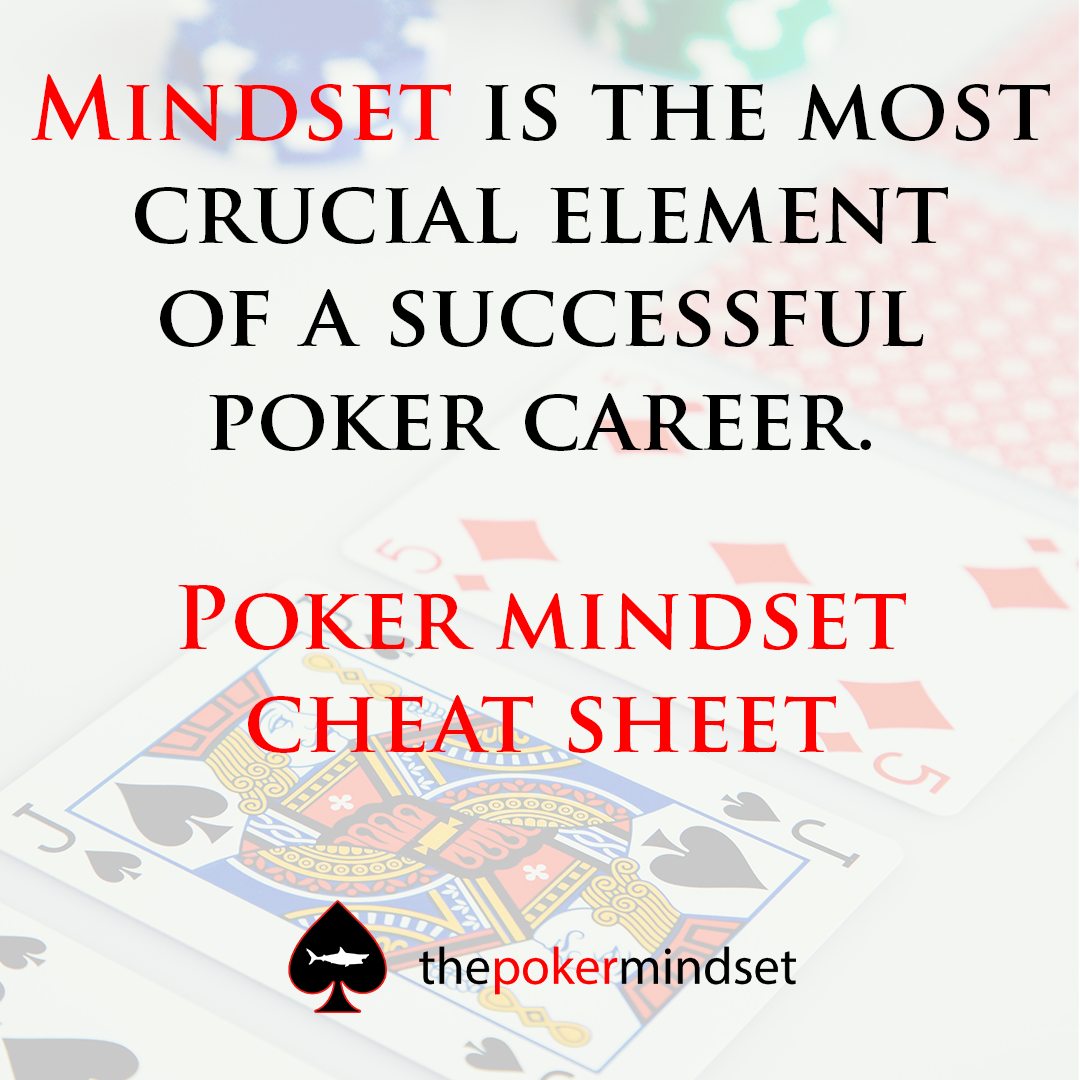To be a profitable poker player you need three things:
- A winning poker strategy
- Good bankroll management
- The right poker mindset.
If you don’t have the right mindset for poker then the other two will not work.
Here is a cheat sheet of the principles you must understand to create the right mindset in poker. Read it any time you need a quick mindset boost. Enjoy!
- Your mindset is the most important factor in achieving your poker goals and dreams. Work on it daily. It will pay off in the end.
- A poker player must understand that poker is not a get rich quick scheme, it is a professional endeavor that requires a lot of hard work on and off the tables.
- Playing poker professionally is not gambling, it is like running a business. Profitable poker is more like operating a casino than emotional gambling if done correctly. You have to look at your monthly/ yearly results and know that you will end up winning over time if you have an edge in the games. What happens in an individual sessions is not important.
- Take responsibility and accept that you – not the cards or luck – are completely responsible for your success or failure as a poker player.
- Put in the hard work! Poker is that awesome and rewarding precisely because it’s so difficult to master. Learn to appreciate this!
- People with very low risk tolerance, who cannot accept losing sessions, are not cut out to be great poker players, since losing is simply part of the game. Mentally tough poker players are able to emotionally accept the uncertainty that is inherent in poker.
- Every poker player has losses, mistakes and downswings. When you replace “Why is this happening to me?” with “What can I learn from it?” everything shifts.
- Complaining is addictive and every time you do it you reinforce the behavior even more. We are trained to complain. It happens because it’s what we see in the world and because our own limitations. And also because we misunderstand poker’s real objective …which is no other than making the best decisions you can consistently.
- Poker players can’t control the outcomes, they can only control their own actions. A losing poker session is just a learning experience not a dangerous assault on your self-worth.
- Mentally tough poker players are in control of their emotions. Poor emotional control leads to poor decisions. You will not be punished for your anger, you will be punished by your anger.
- If you feel overwhelmed by a series of losing sessions, consider taking a few days off, gather perspective and come back later, refreshed and determined. Remember, a downswing does not erase the successes you’ve had and all the progress you’ve made and continue to make. Keep moving!
- The problem with most poker players is that they fall in love with the outcome instead of the process. Enjoy the process!
- It is important to consider poker as a performance activity that requires the same level of discipline and commitment as chess, professional sport or military training. Understanding that poker is a performance activity helps suppress warped expectations. A poker player must appreciate the need for preparation and discipline.
- A good warm up routine helps you approach your poker session with calm, confidence and awareness. If you’re playing unprepared, you are preparing to fail.
- One of the biggest obstacles to poker success is lack of sustained focus. Avoid playing distracted at all costs. Remove any tempting distractions and take regular brakes.
- Many of the greatest poker players incorporate breath work, mindfulness and exercise in their daily routines. Playing well requires awareness, focus and detachment from outcomes. If your goal is to achieve peak performance create good daily habits.
- Work on self-awareness. If you remain unaware of the mental habits that are causing you to play poker poorly or to tilt, you’re unlikely to change. Be wise enough to acknowledge when your mindset is compromised. Don’t be too proud to take some time off and reassess things.
- Great poker players have learned that it’s essential to have internal discipline to counteract the negative effects of euphoria or the overconfidence that comes from a series of winning poker sessions or hands. For a poker player, winning can be dangerous if you haven’t learned how to monitor and control yourself.
- Life and poker are two sides of the same coin. If there is an imbalance in life then there will always be an imbalance in poker. It’s down to you to create the equilibrium.
- Consistently journaling your poker days can be a game changer. Never stop learning, evolving and reflecting.
- Scared money doesn’t make money! You will not be able to execute your winning poker strategy properly if the fear of loss is clouding your thinking. You must allow yourself to play and make decisions with confidence and acceptance. Even if you have to fake it at first.
- Patience is the core ingredient to poker success
- Poker can be so difficult that it’s easy to lose your enthusiasm. However, if you really love the game you will go the extra mile to study and to improve yourself. True passion is a solid foundation for your poker career.
I really appreciate you taking the time to read this article. Be sure to check out my other articles as well:
- 10 Tips For New Poker Players
- Top 35 Must Read Poker Books Of All Time
- The Golden Hour: Powerful Morning Routine For Poker Players
- Why Is Poker Bankroll Management So Important?
- How Great Poker Players Handle Losses
- Top 20 Quotes From The Mental Game Of Poker By Jared Tendler
Do you need a quick poker mindset boost? Click here to get my eBook called 25 Poker Mindset Tips Every Player Should Know.


